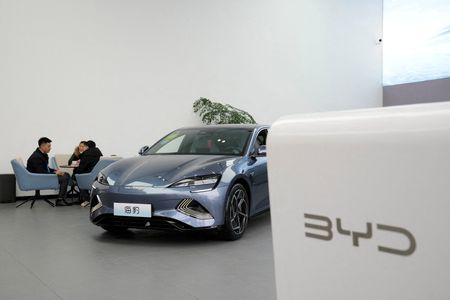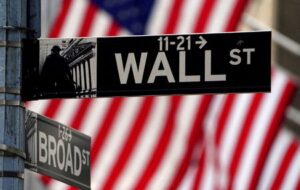By Victoria Waldersee
FRANKFURT (Reuters) -Nearly 900 Chinese auto suppliers and a handful of electric vehicle makers are taking part in a trade fair in Frankfurt as the country’s car sector defies looming trading barriers to expand its global presence and counter sinking profits at home.
Chinese carmakers including BYD, Geely, Hongqi and GAC International were set to display their vehicles at the fair, called Automechanika, as an added feature to the event which normally focuses on suppliers.
“Even if some in Europe turn against us, we will never turn against the European market,” said Victor Yang, senior vice-president at Geely, the only carmaker to host a press conference at the fair.
Geely, which according to Yang sold around 200,000 cars in Europe in the first half of this year, will face tariffs of up to 19.3% on its China-made EVs under current plans by the European Commission, which the company has previously described as “disappointing”.
“Our industry can only be stronger when we work together and cooperate,” Yang said.
China’s auto sector is investing heavily in overseas expansion even as Europe and North America erect trade barriers to stem the inflow of China-made EVs they say benefit from unfair subsidies.
The so-called “EV Expo”, which opens on Tuesday, was set up in partnership with the China Council for the Promotion of International Trade, an added feature to the event usually focused on suppliers.
“We want EVs made by Chinese carmakers, which are currently to some extent unknown, to gain trust in the industry,” Olaf Musshoff, Automechanika’s director, told a press conference.
Chinese carmakers’ share of passenger car sales in Europe rose to 17% in the first seven months of 2024 from 12% a year earlier, according to data from automotive consultancy Inovev, and Chinese car exports have reached record highs this year.
The large presence of Chinese suppliers – almost double the number of German suppliers in attendance – highlights their growing role in the global supply chain as Chinese carmakers increasingly plan local production in Europe and elsewhere to circumvent trade tariffs.
A PwC study released this month warned that focus on cost efficiency and dwindling access to capital were making it harder for suppliers in Germany to invest in innovative technologies.
Chinese companies – often with state backing – were more likely to spend on improving batteries and software, the study said, winning market share from German and Japanese rivals.
Still, the size and scope of Automechanika Frankfurt – with 4,200 companies attending from over 170 countries – demonstrated Europe was still central to promoting innovation in the sector, said Frank Schlehuber of Europe’s supplier association CLEPA.
“Frankfurt is still the centre of gravity,” he said.
(Reporting by Victoria Waldersee;Editing by Alison Williams and Tomasz Janowski)





